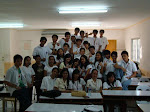
COURSE SYLLABUS
Course Code: ENGLISH 105
Course Title: Writing in the Discipline
Course Description: The writing and critical reading of basic forms of academic discourse essential to university work
Credit: 3.0 units
General Objectives: The course is intended to develop basic writing skills of students in their specific discipline.
Specific Objectives: At the end of the semester, the students are expected to:
1. master the traditional five-paragraph essay and variations of this essay;
2. write compositions observing the principles of effective writing;
3. apply principles of effective writing in the different patterns of essay development and in specialized types of writing;
4. design and write research papers essential for academic work;
5. develop critical reading skills as an essential aid in writing; and
6. master English language sentence skills.
Course Outline:
The course outline, premised on the process-centered approach to writing, guarantees a uniformity of method and skills imparted to students. The course outline, however, allows room for flexibility in terms of time management and allotment of course hours per skill/part of the writing process depending on student competence.
I. Review of Sentence Skills
A. Subjects and Verbs
B. Fragments and Run-ons
C. Regular and Irregular Verbs
D. Subject and Verb Agreement
E. Pronoun Agreement and Reference
F. Pronoun Types
G. Adjectives and Adverbs
H. Misplaced Modifiers
I. Dangling Modifiers
J. Mechanics
K. Punctuation
L. Word Use
II. Essay Writing
A. Introduction to Writing
1. Point and Support
2. Structure of the Traditional Essay
3. Writing as a skill
4. Writing as a Process of Discovery
5. Writing as a Way to communicate with Others
6. Keeping a Journal
7. Using a Computer
B. The Writing Process
1. Prewriting
2. Writing a First Draft
3. Revising
4. Editing
C. The First and Second Steps in Essay Writing
D. The Third Step in Essay Writing
E. The Fourth Step in Essay Writing
F. Four Bases for Revising Essays
1. Point and Support
2. Structure of the Traditional Essay
3. Writing as a skill
4. Writing as a Process of Discovery
5. Writing as a Way to communicate with Others
6. Keeping a Journal
7. Using a Computer
B. The Writing Process
1. Prewriting
2. Writing a First Draft
3. Revising
4. Editing
C. The First and Second Steps in Essay Writing
D. The Third Step in Essay Writing
E. The Fourth Step in Essay Writing
F. Four Bases for Revising Essays
III. Patterns of Essay Development
A. Introduction to Essay Development
B. Description
C. Narration
D. Examples
E. Process
F. Cause and Effect
G. Comparison and Contrast
H. Definition
I. Division and Classification
J. Argumentation
K. Peer Review
L. Conference
M. Workshop
IV. Basics of Research
A. Nature and Definition of Research
B. Purposes of Research
C. Methods of Research
D. Parts of Research Report
E. Research Problem
F. Choosing a Research Problem
G. Sources of Information
H. Research Design
I. Documentation and Systems of Citation (with emphasis on Modern Language Association and American Psychological Association)
J. Peer Review, Conference, Oral Examination
V. Special Skills
A. Taking Essay Exams
B. Writing a Summary
C. Writing a Report
D. Writing a Resume and Job Application Letter
Requirements:
2 objective exams
2 major essays
1 Research Paper (Group Project)
1 critique among preselected specimen writings
short exercises in different patterns of essay development
Quizzes and assignments
participation in class and group discussions and activities
Grading System: The following shall be used as the basis for giving grades:
Class Standing 70 %
Term Examinations/Papers 30 %
100 %
The final grade will be computed based on the 50-50 policy (50% of the midterm and 50% of the tentative final grade)
Class Policies:
No late submissions of any required papers will be entertained.
Students who submit copied/copyrighted works shall be given a final grade of 5.0.
Anyone caught cheating during exams shall be recommended to the University Guidance Office. Grade for that particular exam shall be automatically 5.0.
Wearing of proper uniforms and IDs during class period is a must for proper identification.
Attendance will be checked regularly. In case where attendance is not possible, inform the instructor through formal letter. Any other means (i.e. text message, etc.) will not be entertained.
Required Readings:
To be determined by instructor according to his/her thematic inclinations, thus also falling in line with the course’s spirit of flexibility
References:
Langan, John. English Skills with Readings 3rd Ed., New York: Mc Graw Hill Inc. 2005
A Complete Course in Freshman English by Shaw (7th Ed.)
Reading Into Writing I by Dadufalza
Elements of Style by Strunk and White
Prepared by:
Mr. NOMER N. VARUA
Instructor I
nemesis_bpsu@yahoo.com
nomer1202@gmail.com
+639202721372


No comments:
Post a Comment